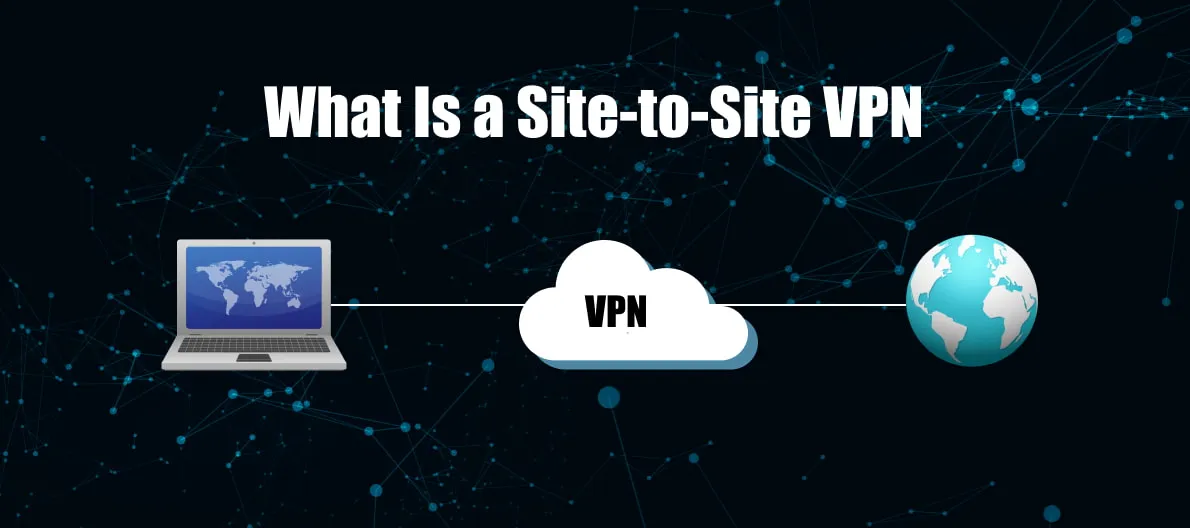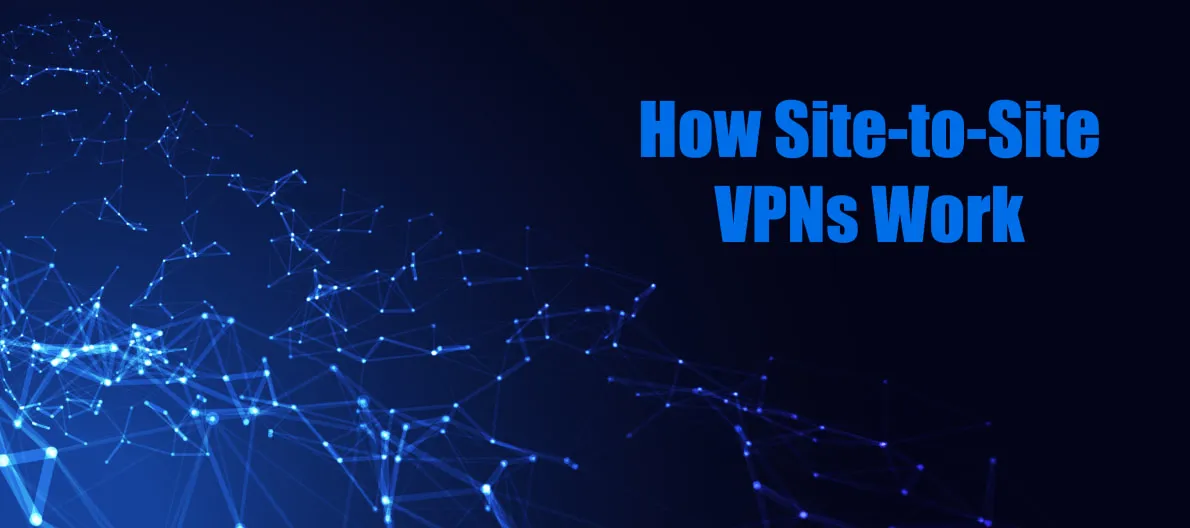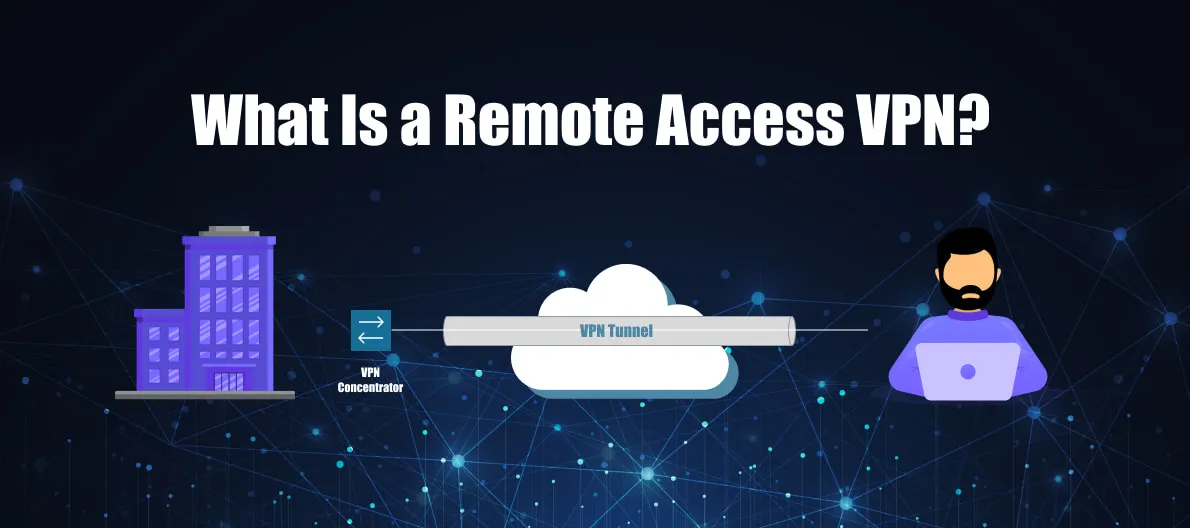What Is a Site-to-Site VPN

Many large enterprises need constant protection of the data they manage. This is necessary so that sensitive company data cannot be stolen or misused. However, the solution for a company having the servers and the headquarters in one location is simple. But what about those enterprises whose headquarters and servers are located in different places?
In this case, a Site-to-Site VPN can help. This technology will help the company maintain a single global network between branches, providing a secure connection for each network user.
Read our article to know what the Site-to-Site VPN is, its advantages and disadvantages.
What Is a Site-to-Site VPN?
A special type of VPN connection is the site-to-site function. With it, companies can link several of their branches at once so that employees can connect to the same network, regardless of their actual location. This method solves many of the problems associated with the costs of connecting special networks through which they can work, increases protective measures, and also improves efficiency during work processes.
This solution is ideal for companies that care about their data and employees, appreciate every minute and care about the financial situation of the company.
Benefits of Site-to-Site VPN
A site-to-site VPN is a VPN connection that allows remote locations to share data securely. A site-to-site VPN connection connects two or more remote locations using a public network like the internet. This type of VPN is also known as a router-to-router VPN.
There are many benefits of using a VPN to website connection.
|
Improved security for remote locations. |
Businesses can encrypt data through a site-to-site VPN before it is sent over the public network. This helps to protect sensitive data from being intercepted by third parties. |
|
Improved connectivity for remote locations |
By using a site-to-site VPN, businesses can connect to their remote locations as if they were on the same local network. This can be helpful for companies that need to share data between their remote locations. |
|
Reduced costs for businesses. |
Businesses can avoid leasing private lines to connect their remote locations by using a site-to-site VPN. This can be helpful for businesses that have multiple remote locations and need to connect them all. |
How Site-to-Site VPNs Work

A site-to-site VPN connection uses two routers to connect two or more remote locations. One router is located at each remote location. The routers are connected over the public network, such as the internet.
Each router has a wide area network (WAN) port and one or more local area network (LAN) ports. The WAN port is used to connect the router to the public network. The LAN ports connect the router to devices on the local network, such as computers, printers, and servers.
The two routers are configured to send traffic destined for the other remote location through the site-to-site VPN connection. This traffic is encrypted before it is sent over the public network. When the traffic reaches the other router, it is decrypted and forwarded to the devices on the local network.
Limitations of Site-to-Site VPN
A site-to-site VPN is a VPN connection that allows for secure communication between two or more devices on different networks. A site-to-site VPN typically uses IPsec or Secure Sockets Layer (SSL) to create a secure connection. While site-to-site VPNs are very effective, they do have their limitations. In this paragraph, we will explore the three main limitations of site-to-site VPNs.
|
Limited Scalability |
One of the main limitations of site-to-site VPNs is that they are not very scalable. This is because you need to configure a new VPN connection each time you want to add a new device to the network. This can be time-consuming and expensive, especially if you need to add multiple devices. |
|
Limited Security |
Another limitation of site-to-site VPNs is that they offer limited security. This is because site-to-site VPNs use shared keys for authentication, which means that if one key is compromised, all devices on the network are at risk. Additionally, site-to-site VPNs do not offer end-to-end encryption, which means your data could be intercepted while in transit. |
|
Difficulty in Setting |
Since each VPN between sites must be completely independent, setting up a tunnel is extremely complicated. Each tunnel has to be individually configured and constantly monitored. |
|
Limited Bandwidth |
Another limitation of site-to-site VPNs is that they often have limited bandwidth. This is due to each device on the network sharing the same connection, which can lead to slow speeds. Additionally, if one device uses a lot of bandwidth, it can impact the performance of other devices on the network. |
Site-to-site VPNs are a type of VPN connection that allows for secure communication between two or more devices on different networks. While VPN to website solutions are very effective, they have limitations, including limited scalability, security, and bandwidth.
What Is a Remote Access VPN?

A Virtual Private Network (VPN) connects two or more devices over the Internet. It allows you to connect to a private network from a remote location and access the resources of that network as if you were on-site. A remote access VPN extends those same capabilities to mobile workers, allowing them to connect to the corporate network from anywhere in the world. This part will look closely at how remote access VPNs work and some of the benefits they offer.
A remote access VPN uses an encrypted tunnel to connect your device to the corporate network from anywhere in the world. When you connect to the VPN, all traffic from your device is routed through the encrypted tunnel. This ensures that any data passing through the tunnel is protected from eavesdroppers and other security threats.
Most remote access VPNs use Internet Protocol Security (IPsec) for encryption. IPsec is a standards-based protocol that has been widely used for many years. It offers strong encryption and authentication capabilities, making it an ideal choice for VPNs.
The most common IPsec VPN type is an IPSec tunnel mode VPN. With this type of VPN, each packet of data is individually encrypted and authenticated. This provides a high level of security but can be CPU-intensive, impacting performance. Another type of IPsec VPN is known as a transport mode. With transport mode, only the data payload is encrypted; headers are left unencrypted. This can improve performance but offers less protection than tunnel mode.
In addition to IPsec, many remote access VPNs also use a Secure Sockets Layer (SSL). SSL is commonly used to encrypt traffic between web browsers and web servers. It can also be used to encrypt traffic between client devices and gateway devices such as routers and firewalls. SSL offers lower overhead than IPsec and can be used in conjunction with it to provide a high level of security without sacrificing performance.
Conclusion
A site-to-site VPN connection can be beneficial for businesses in many ways. It can help improve security by encrypting data before it is sent over the public network. It can help improve connectivity by connecting remote locations as if they were on the same local network. It can also help reduce costs by avoiding the need to lease private lines to connect remote locations. Keep these benefits in mind if you are considering using a site-to-site VPN connection for your business!
FAQ
How many types of site-to-site VPNs are there?
There are two main types of site-to-site VPNs: point-to-point and multipoint. Point-to-point is the most common type, and it involves connecting two locations. Multipoint site-to-site VPNs involve connecting more than two locations, and businesses typically use them with multiple sites.
What is the difference between a VPN and site to site VPN?
The main difference between a VPN and a site-to-site VPN is that it requires special hardware or software at each location it connects, while a VPN can be set up using just software.
Why would I need a siite-to-site VPN?
There are many reasons you might need a site-to-site VPN. For example, if you have multiple sites that need to be connected for business purposes or want to connect your private network to a public space, like the internet.
How do I set up a site-to-site VPN?
Setting up a site-to-site VPN can be complex, depending on your network infrastructure. You will need to ensure that you have two routers that are compatible with each other and are properly configured. You will also need to set up security protocols to ensure your data is safe and secure.